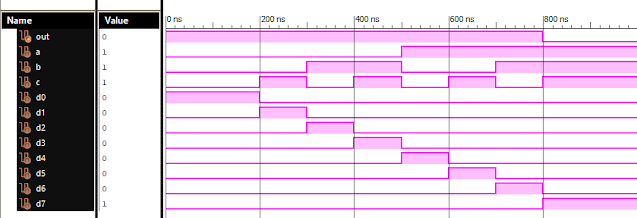Latest Post
Verilog: 4 Bit Full Adder Behavioral Modelling with Testbench Code
- Get link
- X
- Other Apps
Verilog Code for 4 Bit Full Adder Behavioral Modelling with Testbench Code
module 4_bit_Add(
input [3:0]a,b,input cin,
output [3:0]sum,output cout
);reg [3:0]sum;reg cout;
always @ (a or b or cin)assign {cout,sum}= a + b + cin;
endmodule//Testbench code for 4 Bit Full Adder Behavioral Modelling
initial begin// Initialize Inputsa = 0; b = 0; cin = 0;#100 a=4; b=9; cin=1;
// Wait 100 ns for global reset to finish
#100;
// Add stimulus here#100 a=15; b=5; cin=1;#100 a=7; b=5; cin=0;#100 a=6; b=10; cin=1;endinitial begin#100$monitor(“a = %b, b = %b, cin = %b, sum = %b, cout = %b”, a, b, cin, sum, cout);endendmodule
Xillinx Output:
 |
| 4 Bit Full Adder Behavioral Modelling Response |
Also See:
- Get link
- X
- Other Apps
Popular posts from this blog
Verilog: 8 to 1 Multiplexer (8-1 MUX) Dataflow Modelling with Testbench Code
Verilog Code for 8 to 1 Multiplexer Dataflow Modelling module mux_8to1( input a, input b, input c, input D0, input D1, input D2, input D3, input D4, input D5, input D6, input D7, output out, ); module m81( output out, input D0, D1, D2, D3, D4, D5, D6, D7, S0, S1, S2); assign S1bar=~S1; assign S0bar=~S0; assign S2bar=~S2; assign out = (D0 & S2bar & S1bar & S0bar) | (D1 & S2bar & S1bar & S0) | (D2 & S2bar & S1 & S0bar) + (D3 & S2bar & S1 & S0) + (D4 & S2 & S1bar & S0bar) + (D5 & S2 & S1bar & S0) + (D6 & S2 & S1 & S0bar) + (D7 & S2 & S1 & S0); endmodule //Testbench code for 8-1 MUX Dataflow Modelling initial begin // Initialize Inputs a= 0;b = 0;c = 0;D0 = 1;D1 = 0;D2 = 0;D3 = 0;D4 = 0;D5 = 0;D6 = 0;D7 = 0; // Wait 100 ns for global reset to finish #100; // Add stimulus here #100; a = 0;b = 0;c = 1;d0 = ...
VLSI: 8-3 Encoder Dataflow Modelling with Testbench
Verilog Code for 8-3 Encoder Dataflow Modelling module encoder_8_to_3( input d0, input d1, input d2, input d3, input d4, input d5, input d6, input d7, output q0, output q1, output q2 ); assign q0 = ( d1 | d3 | d5 | d7 ); assign q1 = ( d2 | d3 | d6 | d7 ); assign q2 = ( d4 | d6 | d5 | d7 ); endmodule //Testbench code for 8-3 Encoder Dataflow Modelling initial begin ...
VLSI: 1-4 DEMUX (Demultiplexer) Dataflow Modelling with Testbench
Verilog Code for 1-4 DEMUX Dataflow Modelling module demux_1_to_4( input d, input s0, input s1, output y0, output y1, output y2, output y3 ); assign s1n = ~ s1; assign s0n = ~ s0; assign y0 = d& s0n & s1n; assign y1 = d & s0 & s1n; assign y2 = d & s0n & s1; assign y3 = d & s0 & s1; endmodule //Testbench code for 1-4 DEMUX Dataflow Modelling initial begin // Initialize Inputs ...
VLSI: 4-1 MUX Dataflow Modelling with Testbench
Verilog Code for 4-1 MUX Dataflow Modelling module m41(out, i0, i1, i2, i3, s0, s1); output out; input i0, i1, i2, i3, s0, s1; assign y0 = (i0 & (~s0) & (~s1)); assign y1 = (i1 & (~s0) & s1); assign y2 = (i2 & s0 & (~s1)); assign y3 = (i3 & s0 & s1); assign out = (y0 | y1 | y2 | y3); endmodule //Testbench code for 4-1 MUX Dataflow Modelling initial begin // Initialize Inputs a = 1;b = 0;c = 0;d = 0;s0 = 0;s1 = 0; ...
Verilog: 2 - 4 Decoder Structural/Gate Level Modelling with Testbench
Verilog Code for 2-4 Decoder Structural/Gate Level Modelling 2-4 Line Decoder module decoder_2_to_4( input a0, input a1, output d0, output d1, output d2, output d3 ); not (an0,a0),(an1,a1); and (d0,an0,an1),(d1,a0,an1),(d2,an0,a1),(d3,a0,a1); endmodule //Testbench code for 2-4 Decoder Structural/Gate Level Modelling initial begin // Initialize Inputs a0 = 0;a1 = 0; // Wait 100 ns for global reset to finish #100; // Add stimulus here #100; a0=1;a1=0; #100; a0=0;a1=1; #100; a0=1;a1=1; end Output: Verilog 2-4 Decoder Response Other Verilog Programs: Go to Index of Verilog Prog...





Comments
Post a Comment